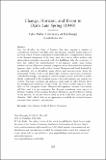Files in this item
Change, horizon, and event in Ozu's Late Spring (1949)
Item metadata
| dc.contributor.author | Parks, Tyler | |
| dc.date.accessioned | 2020-04-16T14:30:00Z | |
| dc.date.available | 2020-04-16T14:30:00Z | |
| dc.date.issued | 2016-10-27 | |
| dc.identifier | 260352466 | |
| dc.identifier | eb30593c-f9b3-4629-b9d4-866f37e1927a | |
| dc.identifier | 85118782465 | |
| dc.identifier.citation | Parks , T 2016 , ' Change, horizon, and event in Ozu's Late Spring (1949) ' , Film-Philosophy , vol. 20 , no. 2-3 , pp. 283-302 . https://doi.org/10.3366/film.2016.0016 | en |
| dc.identifier.issn | 1466-4615 | |
| dc.identifier.uri | https://hdl.handle.net/10023/19815 | |
| dc.description.abstract | Over the decades, the films of Yasujirō Ozu have inspired a number of contradictory responses from film critics and theorists. Initially, formal aspects of his work, which Western commentators found difficult to comprehend in relation to the thematic dimensions of the films, were often said to reflect aesthetic and philosophical principles associated with Zen Buddhism. Like the recurrence of plots that explore the transformations of the Japanese family, many formal attributes of Ozu's films were assumed to express various ideas related to traditional Japanese values. In their work on Ozu, Kristin Thompson and David Bordwell do an admirable job of debunking many clichés and misconceptions about the relationship of Ozu's work to Zen philosophy, aesthetics, and social conventions. Undoubtedly though, a metaphysical outlook emerges in Ozu's work that is neither wholly conditioned by the socialised norms of Zen and tradition, nor entirely free of them. This paper considers and analyses a claim made by Gilles Deleuze about the metaphysical orientation of Ozu's work, one which ascribes aspects of Ozu's style to a Zen conception of time. This particular argument concerns Ozu's famous still lifes, and it is my contention that through considering some aspects of Deleuze's reading of Ozu alongside Bordwell, Thompson, and Noël Burch's writing on the director, we can see what is asked of us by a film like Ozu's Late Spring (Banshun, 1949), which offers us an opportunity to rethink the relations between cinematic form, narrative, and emotion. | |
| dc.format.extent | 189464 | |
| dc.language.iso | eng | |
| dc.relation.ispartof | Film-Philosophy | en |
| dc.subject | Ozu | en |
| dc.subject | Deleuze | en |
| dc.subject | Bordwel | en |
| dc.subject | Burch | en |
| dc.subject | Thompson | en |
| dc.subject | PN1993 Motion Pictures | en |
| dc.subject.lcc | PN1993 | en |
| dc.title | Change, horizon, and event in Ozu's Late Spring (1949) | en |
| dc.type | Journal article | en |
| dc.contributor.institution | University of St Andrews. Film Studies | en |
| dc.identifier.doi | https://doi.org/10.3366/film.2016.0016 | |
| dc.description.status | Peer reviewed | en |
This item appears in the following Collection(s)
Items in the St Andrews Research Repository are protected by copyright, with all rights reserved, unless otherwise indicated.

